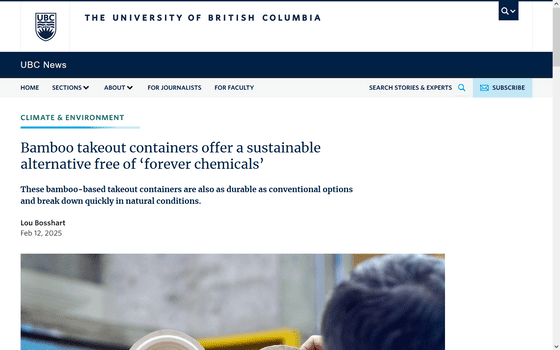'Bamboo' containers are being researched to avoid everlasting chemicals

PFAS, an organic fluorine compound known as an 'eternal chemical' due to its long-term persistence and resistance to degradation in the natural environment, is used in a variety of places, including food packaging, raising concerns about its impact on the environment. To avoid the use of PFAS, a container made of bamboo has been developed.
Bamboo takeout containers offer a sustainable alternative free of 'forever chemicals'

UBC researcher develops bamboo containers free of forever chemicals | Vancouver Sun
Camryn Collett, a student of environmental studies at the University of British Columbia, was researching alternative materials to plastic for packaging and, under the guidance of Professor Changping Dai, an expert on bamboo materials, began researching bamboo as a 'more natural material.'
Plastic containers use PFAS to maintain their heat resistance and stability, and since alternative containers must also have the same properties, Collett has created prototypes using bamboo and starch, which he says have worked to ensure they maintain the same performance as existing products.

Collette tested the biodegradability of over 300 prototype plates made from bagasse (
'While our tests were conducted at industrial standards, at a maximum room temperature of 60 degrees, we found that it would decompose just as quickly under everyday conditions, suggesting it could easily be broken down in a backyard compost pile,' Collett said.
'Bamboo grows incredibly fast. You can grow a small forest in a matter of months. It's a renewable resource that doesn't pollute landfills and can help reduce our reliance on plastic,' Dai said.

Collette says the bamboo plates could be used as take-out containers or to replace the Styrofoam plates you put meat on at the grocery store.
The background to this research is that British Columbia, Canada, is promoting a policy to abolish disposable plastic containers and ban the use of plastic bags in 2023 in order to reduce waste and pollution. In addition, the restaurant industry is restricted from distributing disposable containers made of certain plastics that are difficult to recycle, such as biodegradable plastics, compostable plastics, and polystyrene foam. The use of polyvinyl chloride wraps will be banned by 2028, and the use of expanded polystyrene meat trays will be restricted by 2030, so alternatives to these materials are required. Collett points out that bamboo is also excellent in that it is relatively easy to obtain in Canada.

'Only a small fraction of plastic is actually recycled - about 9 percent - and most of it ends up in landfills or the natural environment,' Collett said. 'The new containers are expected to be priced close to plastic alternatives,' he said, adding that he hopes to launch a commercial venture to provide the containers to restaurants.
Related Posts:
in Science, Posted by log1p_kr







